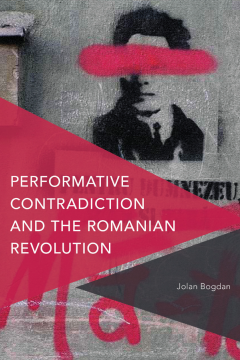
Additional Information
Book Details
Abstract
The Romanian Revolution of 1989 ended 42 years of Communist rule. It was the bloodiest revolution in a Warsaw Pact country, culminating in the overthrow and execution of Nicolae Ceaușescu. However, there was no major democratic reform and power remained in the hands of key figures from the old regime. This has led many theorists to question the authenticity of the entire revolution.
Performative Contradiction and the Romanian Revolution focuses-in on the circumstances which led to these accusations. It argues that the notion of an authentic revolution, as a conceptual paradigm, is neither a sufficient, appropriate, nor useful tool for an analysis of the events in Romania. Engaging with the work of theorists including Stieglar, Agamben, Baudrillard, Badiou, Spinoza and Derrida it argues that performative contradiction is a more useful theoretical model for exploring this event. Applying the concept to specific cases within the revolution, the book demonstrates the power of performative contradiction as an analytic tool.
Jolan Bogdan is a founding member of INC Continental Philosophy Research Group, Goldsmiths, University of London. She is currently editing an anthology on nationalism and maternal ambiguity as a theme in the works of Jacques Derrida. She has taught Visual Cultures at Goldsmiths, University of London, and at the University of Birmingham. She has published articles in Word and Text, Parallax and The International Encyclopedia of Revolution and Protest.
In Performative Contradiction and the Romanian Revolution Jolan Bogdan makes an original and compelling analysis that shows how the deep ambiguities and paradoxes that freight revolutionary situations threaten to render inadequate our philosophical and political vocabularies. The in-depth account of the Romanian revolution is complemented by a fascinating study of the collective psyche of a people under a totalitarian regime and an astute reflection on the nature of violence. The book is a significant contribution to current theoretical and political debate and will be a valuable interpretive resource for the student of history, politics and philosophy.
Elina Staikou, Associate Lecturer, University of Westminster, UK
Drawing on philosophy, psychoanalysis, and ethics, Jolan Bogdan’s Performative Contradiction and the Romanian Revolution closely examines some of the key events around the Romanian Revolution of 1989 and its aftermath, offering a powerful use of critical theory as a tool for interpretation. Bogdan’s work is not simply historical analysis, but rather an investigation of how critical theory can be applied as an incisive and sensitive tool of historical and contemporary analysis, helping us to understand peculiar phenomena such as the contemporary nostalgia in Romania for communism and the lingering cult of personality around Ceauşescu. Throughout, Bogdan approaches challenging and complicated texts with great care, making them accessible as tools for interpretation, while articulating the subtleties and richness embodied in these texts in her analysis of performative contradiction.
Kevin Richards, Associate Professor, Pennsylvania Academy of the Fine Arts, author of Derrida Reframed: A Guide for the Visual Arts Student
Authenticity has always been a problematic concept for politics, not least when applied to the idea of revolution, where the claim to authentic actions and beliefs, like the repudiation of the inauthentic, often obscures more than it reveals. Jolan Bogdan brilliantly proves as much in this provocative exploration of the Romanian Revolution of 1989, developing the notion of performative contradiction as a compellingly productive alternative to questions about authenticity that have typically been the focus of historical and philosophical treatments of this same moment. But in drawing on an impressively wide range of traditions and thinkers, Bogdan not only illuminates the world-historical significance of events in Romania, but also demonstrates how a sharpened attention to performative contradiction might have far-reaching and surprising implications for our understanding of the political today.
Emilio Sauri, Associate Professor, University of Massachusetts Boston, USA
Within the concluding section of the book, Bogdan demonstrates that performative contradiction, as a conceptual paradigm, proves a “productive and versatile” tool, which can be successfully employed to examine a variety of recent events, ranging from the Arab Spring and the current tensions within the European Union to the ongoing refugee crisis (190). Reading this volume, one becomes more and more aware that performative contradiction is indeed a useful tool, which not only enables new insights into the intricacies of the bloody revolution of 1989 in Romania, but also allows new approaches to worrisome phenomena facing the present day world.
Table of Contents
| Section Title | Page | Action | Price |
|---|---|---|---|
| Cover | Cover 1 | ||
| Half Title | i | ||
| Series Information | ii | ||
| Title Page | iii | ||
| Copyright Page | iv | ||
| Contents | v | ||
| Acknowledgements | vii | ||
| Introduction: In Search of a New Paradigm for the Romanian Revolution | 1 | ||
| Notes | 14 | ||
| Chapter One Performative Contradiction: Structuralist and Post-Structuralist Perspectives | 15 | ||
| Notes | 40 | ||
| Chapter Two The Performance of Authenticity: Philosophers Question the Revolution | 45 | ||
| Notes | 61 | ||
| Chapter Three The Problem with the “Event”: Badiou’s Split Loyalties | 63 | ||
| Notes | 82 | ||
| Chapter Four Nostalgia for the Old Regime: A Freudian Interpretation | 85 | ||
| Notes | 106 | ||
| Chapter Five Pro-Natal Legislation and the Systematic Destruction of Intimacy | 111 | ||
| Notes | 132 | ||
| Chapter Six The Interruption of Mourning: On Forbidden Burials | 137 | ||
| Notes | 160 | ||
| Chapter Seven On Violence: Can the Revolution Be Saved? | 163 | ||
| Notes | 187 | ||
| Conclusion: Other Examples | 189 | ||
| Notes | 196 | ||
| Bibliography | 199 | ||
| Index | 207 |
